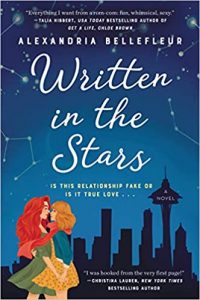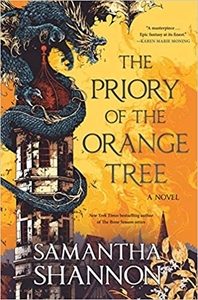This book is sold as Bridget Jones meets Pride and Prejudice, and it does have nods to both of those, but it’s a delightful story all of its own. The story begins with Darcy and Elle having a disastrous first date. However, Elle is working with Darcy’s brother, so they can’t just pretend it never happened. After Darcy pretends to her brother that it went well in order to stop him setting her up again, she has to persuade Elle to fake-date. If you’ve read much romance you can probably predict most of the plot from there–shenanigans as they play up the romance in public and the inevitable development of real feelings.
As ever with this trope the “reasons” they fake date are a little dubious, but in this case it made sense within the story. It helped that both Darcy and Elle were very well realised characters. At the start of the book, Darcy appears to be anti-social, particular about her life and married to her work. Elle seems like a fun-loving free spirit. However, throughout the book we learnt more and more about them and they both became increasingly complex. We got to dive quite deep into their characters and the way their personalities interacted. They were very different–the book had both of their points of view, which I loved–and the way their contrasting personalities gradually came to complement each other was really well done. You got to see opposite points of view on several topics, which was fun. Both of them were also really sweet and likeable. I found it impossible not to root for them. Their romance was also well developed. It was really shown how much the characters came to like each other as friends as well as just being attracted to each other. This is something I find is often underdone in romance books, so I was pleasantly surprised by how well it was done here.
I also loved that both of the characters had other problems that they were working through, and that they both developed throughout the story. There’s a storyline about Elle’s relationship with her family, her business and one about Darcy’s past relationships. I will say some of this I found to be less interesting than other bits–for example, there’s quite a lot of astrology in this book, which personally I’m not super interested in. On the other hand, neither was Darcy, so the book did acknowledge the sceptic point of view.
The story is obviously quite focused on Elle and Darcy, but the side characters that were introduced were also given a lot of personality and I enjoyed reading about all of them. Elle’s best friend Margot and Darcy’s brother Brendan get quite a bit of page time, and it was really enjoyable to see the different ways they acted and were perceived in each of the points of view. Bellefleur did a great job of avoiding some obvious cliches for these characters too. All of their actions felt extremely realistic and character driven, rather than just to drive forward the romance plot (which can be another common pitfall of romance books).
There is some miscommunication in this book, so be aware if that’s something you dislike in romances. However, it’s very minimal, and I think it was justified well by the character’s backstories.
Overall this was a lighthearted read that I got through very quickly, and the most enjoyable romance I’ve read in a while. If you’re looking for a sweet sapphic romance you should definitely pick this up when it comes out!



